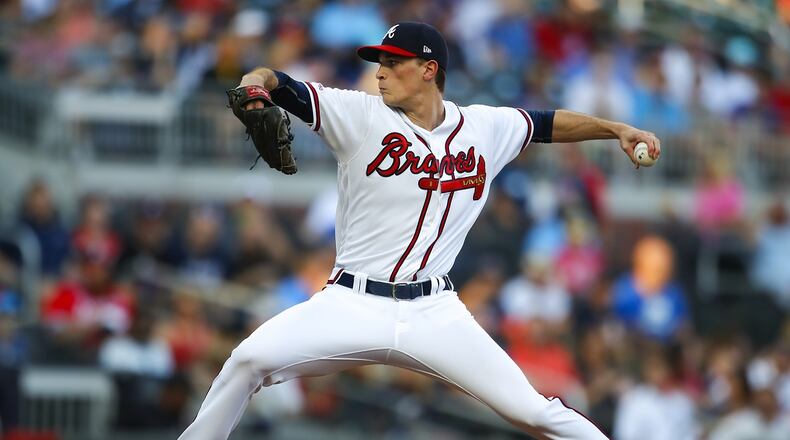The Braves who showed up in San Francisco and St. Louis didn’t look like those who played in Tuesday’s return home.
Stephen Strasburg pitched well, stifling the Braves’ bats in Washington’s 5-4 win, the first of a brief two-game series. Winners of five consecutive series, the Braves’ old woes resurfaced in their first meeting with the Nationals.
“We walked two in and lost by one,” manager Brian Snitker said. The Braves’ record, 30-25, is acceptable given their expectations. But walks never seem too far from their losses, and it’s a flaw that doesn’t go unnoticed.
The Braves struggled with the strike zone. Max Fried, who threw 88 pitches (53 strikes), uncharacteristically walked three. His final walk came with the bases loaded, awarded the Nationals a 3-2 lead and chasing Fried from the game during a three-run sixth inning for the visitors.
“His pitches got away from him - he’s been so precise, and he wasn’t bad tonight,” Snitker said. “It’s not going to be pinpoint all the time. I thought he did a great job with staying in counts and keeping the game in check.”
Anthony Swarzak, pitching in his first home game, issued a four-pitch bases-loaded walk upon entry, expanding Washington’s lead. Howie Kendrick homered off Swarzak in the seventh for a 5-2 lead.
In all, the Braves walked six hitters. Bases on balls have been a recurring enemy through the season, and though they’d been more tamed lately, walks feel like the inevitable doom looming around the corner of every tight game.
That hadn’t been the case lately, however. The Braves were 12-4 in their last 16 entering Tuesday, winning in large part because of that improved pitching, especially in the rotation.
Not only has Fried spearheaded their starting five, but he’s received generous run support in doing so. He was receiving over nine runs of support over nine innings, second most in the majors, before his latest showing. The Braves gave him just two to work with this time, courtesy of Nick Markakis’ RBI-single and Brian McCann’s sacrifice fly in the fourth.
Since Snitker’s lineup change, the offense ranked among the league’s finest. But Strasburg, while often injured, looked the part of an ace in dismantling the Braves. They had five hits against the former No. 1 pick but couldn’t piece together one of the offensive eruptions that’s so often resulted in wins.
“That was my first time facing him, I felt like he had a pretty good curveball today,” said Josh Donaldson, who went 2-for-4. “Almost like a changeup curveball, would get there and stop then go the other way. Whatever it was, he had a pretty good curveball.”
Strasburg struck out 11 over seven innings, leaving breathing room for the Nationals’ MLB-worst bullpen.
That’s the thing about having such a leaky ‘pen: Run support really matters. Austin Riley launched a two-run homer off Kyle Barraclough in the eighth that pulled the Braves within a run. It was his sixth in 13 games and the flashiest part of a three-hit day.
“He did it again,” Snitker said. “He’s battling and staying alive in that batter’s box. It’s an explosion when he hits it too. He has some kind of power.”
Dansby Swanson was left stranded at first in the ninth. And as Snitker said, they lost by one after walking in two runs.
The Braves start Kevin Gausman on Wednesday, hoping to salvage a series split. The Braves and Nationals should get used to each other: They have 18 more meetings, and Washington will comprise roughly 17 percent of the Braves’ remaining schedule.
About the Author
Keep Reading
The Latest
Featured



